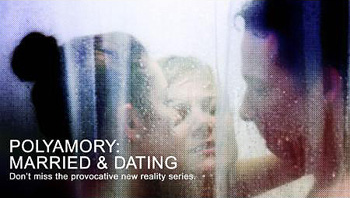 Ever since Showtime's Polyamory: Married & Dating premiered three weeks ago, the internet has been abuzz with opinions about it.
Ever since Showtime's Polyamory: Married & Dating premiered three weeks ago, the internet has been abuzz with opinions about it.
The blog Modern Poly has reviewed episodes one and two, and has documented the positive and negative reactions to the show on Twitter and beyond. Blogger Kiki lamented the lack of diversity on the show, while Brian Ballard discussed the editing style and Jane Doe asked whether the show plays on stereotypes of poly folks as sex-obsessed and drama-mongering.
Psychologist Deborah Anapol, who has written several books on polyamory and was instrumental in the formulation of the modern poly movement, wrote about the show on Psychology Today, calling the reality format "certainly more enjoyable than parading a poly family or two out to be interviewed by a talk show host and then letting a hostile audience have at them as was the style back in the day."
Polyamory: Married & Dating is also the subject of Polyamory Weekly's latest podcast, in which Minx and LustyGuy discuss the accessibility of the characters and their communication skills.
Also notable are the responses from mainstream, non-poly sources, like this review at A.V. Club, and this article on Gawker, calling the show "the best reality show on TV." The writer asserts that the communication-heavy poly lifestyle is perfect for the interview-based, reality show format. Although some of his attraction to the show is based on its "trashiness," he acknowledges that his fascination has depth:
The emotional articulation of the four described people makes for riveting viewing -- not since the early days of The Real World have I been so obsessed with watching people sit around and babble about themselves and their lives, nor have I so deeply lamented that they only do it for 30 minutes once a week . . . While the show illustrates the emotional complications and possible turmoil that result from loving more than one person, it humanizes those involved to a degree that we've never seen. It is at once a cautionary tale and an argument for the freedom to participate in these kinds of living/loving situations. As such, it is as complicated, strange, hilarious and involving as these situations clearly are themselves.
Polyamory: Married & Dating can be found on Showtime on Thursday nights at 11 p.m.

 Ever since Showtime's Polyamory: Married & Dating
Ever since Showtime's Polyamory: Married & Dating